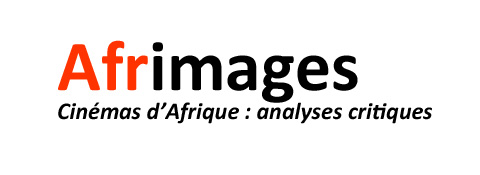(translation of the article published on the Africultures website) During the 14th African Cinema Festival – Lausanne (Switzerland), filmmakers Naziha Arebi (Freedom Fields, Libya), Aché Coelo (Between Four Walls, Chad), Joël Karekezi (The Mercy of the Jungle, Rwanda), Amina Abdoulaye Mamani (In the Footsteps of Mamani Abdoulaye), Kivu Ruhorahoza (Visual Anthropology and Tourism in the Wake of a Romantic Break Up, Rwanda), Peter Sedufia (Keteke, Ghana) and Michel K. Zongo (No Gold for Kalsaka, Burkina Faso) were invited to discuss the creation process of their films. The round-table discussion was moderated by Alex Moussa Sawadogo, the festival’s artistic advisor, and the critic Olivier Barlet.
Olivier Barlet – Naziha, how was Freedom Fields born?
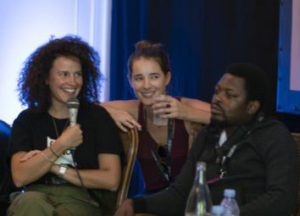
Naziha Arebi on the left, Peter Sedufia on the right with his translator
Naziha Arebi – I was born in the UK, my mother is English and my father is Libyan. I didn’t have much connection with Libya, as my father no longer had many contacts in Libya and didn’t learn Arabic. So I had a kind of feeling of detachment from that country. Rather than being angry with my father because of the lack of transmission about my origins, I told myself I could do it myself! I went there for the first time in 2010. I’d heard about this women’s football team that couldn’t play and that nobody had seen. I liked mysteries and since I played football as a youngster, it aroused my curiosity. In 2011, having returned to Libya during the revolution, I first met some political elites but I was not comfortable in this environment. Then I met this women’s team with mixed origins.
I didn’t think it would last 6 years! Things have changed over the years, especially with the revolution. It was striking to see how these women evolved with the political climate, and how it created a connection between them. The film had to be intimate with the current political and war context.
Naziha Arebi to the left and her translator, Peter Sedufia to the right
Alex Moussa Sawadogo – Joël, to deal with the acts of violence of the Rwandan genocide and the armies in the Congo wars, you place the forest at the heart of The Mercy of the Jungle, why?
Joël Karekezi – For my first feature film Imbabazi: Forgiveness, a question disturbed me. It began when genocidaires were helped because they agreed to ask for forgiveness. My father was killed during the genocide, and I’m lucky I don’t know who killed him. But a question grew inside of me: if I knew who killed him, what would I do? I needed to feel if forgiveness was possible. And if so, why? And then I realized that there were sacrifices to be made in order to move the country forward.
With the second feature film, it’s the war I’m questioning. I did some research, and my cousin told me how he got lost with his friend in the jungle. It immediately spoke to me, because when you have weapons, you think you’re strong, and no one will be able to oppose it, but in the jungle, it makes you discover life.
Olivier Barlet – Indeed, the jungle is a real character in the film. It provokes introspection on the question of violence, which works these two beings in different ways. This relationship with nature is a kind of reminder of the origin, and proves to be initiatory. It allows the relationship that is established within the duo to evolve for each one towards a different becoming. This jungle reminds us of the urgent problem of the relationship with nature, of which we gently understand that we are not the absolute dominators. This question runs through your film as much at the aesthetics level (the very sensitive apprehension of this jungle with its texture and sounds) as in a scenario that invites us to get out of the violence cycle.
Joël Karekezi – Yes, what’s important is the evolution that the jungle allows. Whether through image or sound, I wanted people to be able to feel the changes of these two characters who are two opposites, but will grow and understand each other. It’s the jungle that will control the situation.
Alex Moussa Sawadogo – Michel, in your documentary writing, you seem to be asking more and more disturbing questions, until No Gold for Kalsaka, which deals with the ecological and economic disasters but also health, caused by a gold mine that was supposed to be profitable.
Michel K. Zongo – I deal with subjects that concern me, heavy subjects, but I prefer subjects that concern the world. I live in this country, but I belong to the human community. Mining is an international problem. So my film deals with an unfortunately basic story that questions the international governance, the hoarding of natural resources and our responsibility as humans to exploit and manage what nature offers us.
I use unconventional devices to accommodate both personal and international stories such as mining. Basically, there is a simple subject, a problem that needed to be talked about. I wanted to express the complexity of the subject and do it in an artistically disturbing way to move people.
Gold brings us back to those people who came, pillaged the gold and left at the time of the western rush. So I wanted to explore the western fields, with the good and the bad. The good ones are the villagers: it’s clear that I choose my side! The challenge was not to remain simplistic and use cinema to move people internationally, while showing an African experience.
Olivier Barlet – You are doing this as part of your collaboration with Christian Lelong, which is deepening.
Michel K. Zongo – In a film, a producer is important. He is a support, a person who asks questions, who questions.
Olivier Barlet – Today, we see more and more investigative journalistic documentaries that really tackle social problems. They give a voice to the people concerned and ask the decision-makers the questions that anger them. This does not exclude a cinematic approach. In the film there is a town crier, who you might think is the voice of the director. There is no commentary in the film, but there is a town crier. Is this the affirmation of a point of view?
Michel K. Zongo – I am already present in the film because I hold the camera, I do it as long as I can, so that people know that I am not cheating, that I am really integrated in my approach. What I wanted to convey is everything I hear in the locations, in the news, in the newspapers. It seems like a rumour, like hearsay. I don’t want to take the place of the liar, and therefore not tell what I can’t verify. Since public rumour exists everywhere in society, it needed the voice of the crier or a crazy man. He’s impersonal, he’s unattached. It’s staged, I deliberately gave him little symbols: he’s got a quilted jacket, he doesn’t have traditional clothing as you often see in order to show it’s African, that it’s linked to a tradition. He plays the role of making things more obvious. He addresses the spectators completely, telling, reading, presenting at times, and detaching himself. At first, nobody knew that the water was contaminated. The villagers were worried about it. As soon as I understood it, I decided that we were going to act as if we were making a movie, as if it were true. He was going to be the trigger for this denunciation. The rest is obvious: you can see the hole, it’s pretty physical for those who can get there. We know that the mining company looted, but we didn’t think it would go until the contamination of the water. It was during the filming that we broke into this universe. I wanted to make the cinematic gesture as complex as possible.
PAS D’OR POUR KALSAKA – BANDE ANNONCE from Film Five on Vimeo.
Olivier Barlet – This is where cinema takes on its full importance and where film really becomes a political actor in society. Let’s move from documentary to fiction. Michel sets up mechanisms. The danger is to distance oneself from reality. In Keteke, it’s the contrary: you get out of reality to better enter it. A couple on a railway track, who missed the train that would have allowed the woman to give birth at her mother’s home. A comedy, with a rather crazy relationship between these two characters, to the point of being confronted with witchcraft. Peter, how can you make a film in a form that breaks with the usual mainstream in Ghana or elsewhere and with a very low budget?
Peter Sedufia – In 2015, I had the chance to travel to Finland thanks to an exchange program with the school where I studied in Ghana, I realised that the transportation system was very efficient and effective compared to my country. In my home village, a bus came once per week. If you missed the bus, you had to wait until the following week. That’s what inspired me, I didn’t want to wait a week but rather a couple of hours. That’s why I chose the train. My budget was $25,000, and I had funds thanks to some very good friends. I was lucky to work with very good Ghanaian actors who had seen my short films that I directed in cinema school and who trusted me.
Olivier Barlet – I had chaired a workshop on criticism at the Accra Film School, NAFTI, in 2005. The students were of an extraordinary quality. However, the film production system in Ghana at the time was completely in the Nollywood style, under the influence of Nigeria, with huge aesthetic mediocrity and destined to a video circuit rather than a film circuit. At the time, together with the Nigerian journalist Steve Ayorinde, we had interviewed Kwaw Ansah, one of the greats of the Ghanaian cinema, who had told us: « Hollywood has served the black race so badly, but when we have the opportunity to tell our own stories, we do worse than Hollywood by doing juju » (which means « witchcraft »). Today, we see Ghanaian films developing an aesthetic research with innovative speeches such as Blitz Bazawule’s The Burial of Kojo. How does arthouse cinema manage to be reborn in a country where it had practically disappeared?
Peter Sedufia – That’s a real challenge as a director. To be sure that a film makes money, it’s necessary to submit it to festivals. But before beginning a film, the majority of producers doubt it’s capacities to be profitable. It is hard to get out of these commercial constraints. I made two so-called commercial films that worked extremely well in Ghana. And we could believe that they would bring back a lot of money, but Keteke, a mix between commercial film and arthouse cinema, really pays off in the longterm by taking the film abroad.
Eleven airlines broadcast Keteke and that generates funds in the long term, while commercial films in Ghana pay off in the short term. People like to be entertained. I try to mix the commercial aspect with the arthouse aspect (which draws more interest in festivals). My distributor in South Africa has told me that films that are likely to be well received in festivals are not necessarily distributed, mainly because of language problems. It’s always a challenge…
Alex Moussa Sawadogo – Let’s move to Rwanda. Kivu, after two feature films – Grey Matter and Things of the Aimless Wanderer – you’re back with Visual Anthropology and Tourism in the Wake of a Romantic Break up, a very personal film shot in Zanzibar. What do these films have in common?
Kivu Ruhorahoza – All my films, even the next one, are inhabited by characters who come from the middle class. A middle class that travels, that has its own worries, that suffers from some trouble: depression, general disarray, pessimism. With this short film the character lives in New York and decides to go to East Africa. For a few years and after months of reflection, I felt really frustrated not to be able to tell the world, even though I travel a lot. A French person can make a French film in Ukraine, Brazil, the Philippines, but an African film has to stay in Africa, preferably in the director’s country.
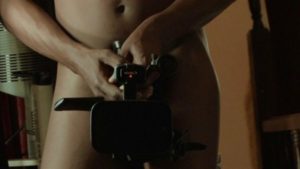 I wanted to make a film in Zanzibar, because the first time I went there, I was amazed. I had gone there as a tourist but when I went back, I was in another state of mind with personal issues. I saw another Zanzibar: conflicts between the youth and the elderly, Christians and Muslims, tourists and locals, women and men. And it hit me. It raises questions about the occupation of space: tourists occupy the beach, a space used by the locals, sometimes at the same time. It is their place of work, whereas it is a place of rest and entertainment for tourists. Even the children are very aware, intuitively, that they should not interact with black children, who are there to help their parents to collect shells. So it’s an anthropological look. I found that there was matter to make a film about. I don’t necessarily ask a funding agency. Since 2014, I have been able to film myself and offer this look. This way, I continue to work between two feature films.
I wanted to make a film in Zanzibar, because the first time I went there, I was amazed. I had gone there as a tourist but when I went back, I was in another state of mind with personal issues. I saw another Zanzibar: conflicts between the youth and the elderly, Christians and Muslims, tourists and locals, women and men. And it hit me. It raises questions about the occupation of space: tourists occupy the beach, a space used by the locals, sometimes at the same time. It is their place of work, whereas it is a place of rest and entertainment for tourists. Even the children are very aware, intuitively, that they should not interact with black children, who are there to help their parents to collect shells. So it’s an anthropological look. I found that there was matter to make a film about. I don’t necessarily ask a funding agency. Since 2014, I have been able to film myself and offer this look. This way, I continue to work between two feature films.
Olivier Barlet – You used the word « look », which is at the centre of the film and your cinema. The previous film was about the question of the Western look over Africa. Here, the tourists photograph Zanzibar and you photograph the tourists photographing Zanzibar… At some point, you are naked in your hotel room, you take your camera and you film from this nudity. I understand this as the desire for a new look, the search for a rebirth. The West looks at Africa, Africa looks at the West, and finds it very difficult to look at itself, to emerge a cinematography that has its own way of existing. Hence your approach, which could be qualified as experimental?
Kivu Ruhorahoza – When I was filming in Zanzibar, my camera was visible, I never wanted to hide it. A week before, I was trying to understand the meaning of my approach and my presence in Zanzibar, especially the fact that I was a foreigner there myself. As I was filming, I was wondering: who will be interested in this film? The tourist goes to Zanzibar, the local tries to get as much out of him as possible, and everyone is happy. What legitimacy do I have to tell all this in an experimental way? At some point, I realised that it was intellectual masturbation! I was filming tourists filming locals, and I watched people for hours doing nothing. Was that necessary?
Olivier Barlet – We continue our brainstorming session with Aché Coelo, who presented an older film, dating from 2015: Entre 4 Murs, but who is also present at the festival to support the youth’s training and the emergence of Chadian cinema. The same question as for Peter is asked: how can a arthouse cinema emerge in a country where only a few directors have made a breakthrough at the international level?
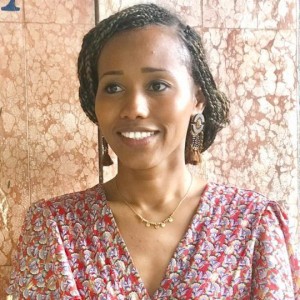
Aché Coelo
Aché Coelo – When the question was asked to Peter, I answered at the same time and I thought to myself that we don’t have this commercial side. The question of exporting our works is very complex. It seems to me that this is the first time that Chadian cinema has been given a place of honour in a focus. This means that the work that is done is bearing fruit, whereas almost all the works that are produced by young Chadians, and even their elders, are arthouse films. The economic model is not the priority. The priority question is: how do you write a film, how do you make it and how do you show it? It’s already quite a hard struggle!
Alex Moussa Sawadogo – You represent a new generation. When we talk about Chadian cinema, we obviously think of Mahamat-Saleh Haroun who contributed to this emergence. You, with limited means, you manage to set up activities in Chad and give a bit of help. What motivates you?
Aché Coelo – I come from the northern region, I am a Muslim. In my circle, cinema is not perceived as a noble profession, but I have managed to impose respect around me. I take action, and people appreciate it. Haroun had a film school project, but it never saw the light of day. As I wear a humanitarian cap, I found the funding by mixing cinema and human rights. With a few partners who support us, our small budgets don’t allow us to make feature films: we started with short films, with six or seven of them. And little by little we are taking up space. When we show our films abroad, the country is represented. That’s what motivates us, but on the ground, things only evolve with a lot of difficulty.
Alex Moussa Sawadogo – You managed to set up a short film festival in N’Djamena, and training courses. If local directors are unable to produce short films, how do you manage to feed this festival?
Aché Coelo – In 2018, there was no competition. We had taken films that we had had for years. My last short film dates from 2017. It’s not the subjects or the scripts that are missing, but the funds and the time because I’m also working on other projects. The challenge is to find funding so that over the year, we could produce five or six films to be presented and that after a few years, we could move on to feature films.
Alex Moussa Sawadogo – Amina, your film focuses on your father, a politician who wanted to change Niger, but also on the questions raised by his disappearance.
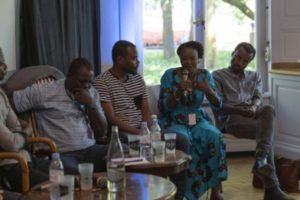 Amina Abdoulaye Mamani – My father’s story is known by Niger and Africa, but I didn’t know it. I learned by hearing people and my family talk about it. That’s how I had the desire to go search for this father and this story. This allowed me to know better the history of Niger. Before, I didn’t know anything. I’m not the only one: my generation only knows the version of the regime that France put in place.
Amina Abdoulaye Mamani – My father’s story is known by Niger and Africa, but I didn’t know it. I learned by hearing people and my family talk about it. That’s how I had the desire to go search for this father and this story. This allowed me to know better the history of Niger. Before, I didn’t know anything. I’m not the only one: my generation only knows the version of the regime that France put in place.
Olivier Barlet – We met eight years ago and Amani was already working on this film. It would have taken her ten years to do it, the time to gather testimonies and archives. Even on the internet, it’s absolute emptiness. A historical figure that no longer exists. An erased history. So we see films being made about historical omissions and trying to clear history. This work of memory is one of the essential functions of documentary cinema. Your father also wrote Sarraounia, from which Med Hondo made a film.
Amina Abdoulaye Mamani – Indeed. My father’s union and political struggle helped him to write Sarraounia, a queen who had opposed the colonial conquest on which he had done deep research. My generation knows nothing about all this. The novel is studied at school, but the teachers would always introduce Mamani as a writer, not as a politician.
Alex Moussa Sawadogo – We talked about the difficulty of producing the film.
Amina Abdoulaye Mamani – Niger is no different from other countries. In the lack of politics in favour of cinema, funding has to be found abroad. This pushes us towards co-productions.
Translated by Saral Lebeau with collaboration of Madelyn Colvin
